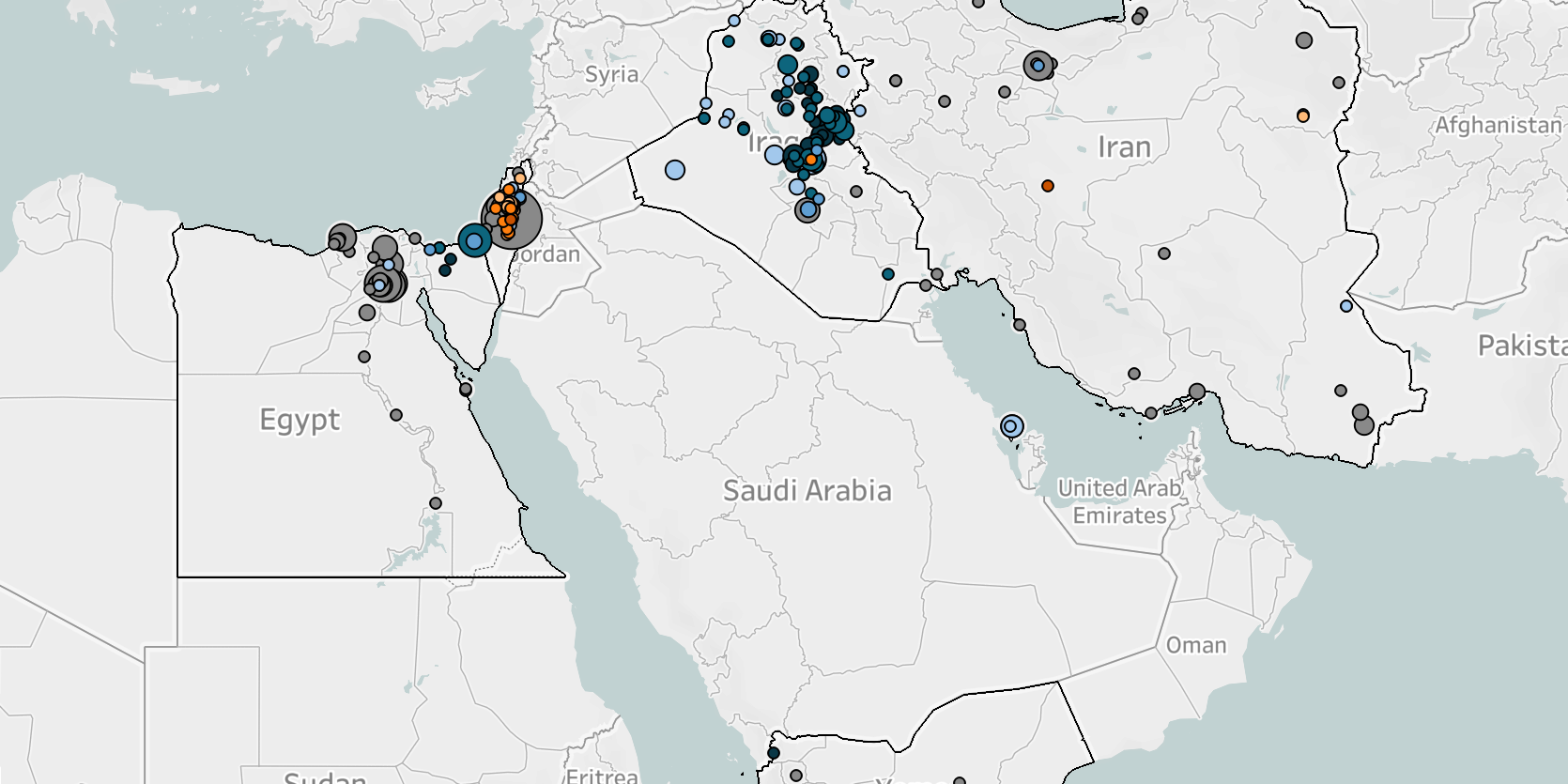Last week in Yemen, pro-Houthi forces increasingly targeted Tarawih prayers — a prayer held specifically during Ramadan — banning the practice in several mosques in Sanaa and shutting down mosques in Dhamar. In Palestine, riots broke out following a demonstration by a far-right anti-Arab group chanting slurs, which left East Jerusalem mired in violence for at least two days. In Israel, the government has made arrangements for the celebration of Lag BaOmer on 29 April. In Bahrain and Egypt, mosques have continued to be shut down for the second week due to alleged violations of coronavirus-related restrictions. A Coptic Christian was killed by Islamic State (IS) affiliated militants in Egypt, a week before the start of Orthodox Easter. Lastly, Iranian intelligence forces launched an arrest campaign targeting Christian converts in Dezful.
In Yemen, pro-Houthi forces continue to enforce further restrictions around Tarawih prayers. Pro-Houthi Zainabiyat (women’s unit) forces shut down a number of women prayer halls across Sanaa, after women refused to attend lectures promoting the ‘Houthi ideology’ after Tarawih (Al Mashhad Al Yemeni, 19 April 2021). Also, in Dhamar governorate, pro-Houthi forces shut down a Salafi studies center and mosque, and expelled the administrators as well as students, preventing them from praying Tarawih (Khabar Agency, 22 April 2021). Several other mosques were also shut down in Dhamar.
In addition, the Houthi-appointed mufti, Shams Al Din bin Sharaf Al Din, issued a fatwa banning the use of loudspeakers by mosques because of the noise they cause. Exceptions were made for the adhan (Muslim call to prayer) and the sermons of the Houthi leader Abdul-Malik al-Houthi, effecitively barring the dissemination of sermons and daily prayers (Al Mashhad Al Yemeni, 22 April 2021).
In Palestine, riots in East Jerusalem broke out on 22 April following a march by far-right anti-Arab Lehava members, as well as ultra-Orthodox Jews, chanting “Death to Arabs” near Palestinians who were demonstrating at Damascus gate in the Old City (CNN, 23 April 2021). This uptick in tensions is said to have been due to the posting of a series of videos on social media showing young Arabs attacking ultra-Orthodox Jews. Israeli police used metal barricades to keep the far-right rioters away from Damascus gate. Later, they used water cannons, stun grenades, and mounted police to push the rioters back towards West Jerusalem (The New York Times, 23 April 2021). Palestinians, who had been demonstrating against the closure of the gate, clashed with police, leaving over 100 Palestinians injured including some requiring hospitalization, and 50 arrested (Arab News, 23 April 2021).
Palestinians had already been clashing with Israeli police daily since the start of Ramadan following their being barred from gathering on the steps in front of Damascus gate. Damascus gate serves as a traditional meeting place for Palestinian youth to gather after breaking their daily fasts. The violence was the culmination of rising tensions due to the centrality of East Jerusalem to the claims of both sides; Israel claims the entirety of Jerusalem while the Palestinians look to East Jerusalem as their future capital (Daily Sabah, 29 April 2021). t
In Israel, the government agreed to allow celebrations of Lag BaOmer — a Jewish celebration marking the 33rd day of the Omer, a seven-week period that begins on the second evening of Passover. The government only imposed restrictions at the bonfire areas on Meron Mountains, citing coronavirus considerations, but otherwise allowed celebration in open areas (Kikar, 20 April 2021).
In Bahrain, the government shut down three more mosques citing coronavirus violations, bringing the total to eight mosques shut down since the start of Ramadan (Bahrain News Agency, 22 April 2021). In Egypt, several mosques were also closed due to the pandemic, and imams were fined for failure to comply with the Ministry of Health’s coronavirus measures.
Also in Egypt, in North Sinai, an IS-affiliated group executed a Coptic Christian civilian who was kidnapped in November 2020. Egyptian military forces killed the three militants who were allegedly involved in the execution. This comes as Coptic Christians are readying for the celebration of Orthodox Easter on 2 May. Almost all churches across Egypt have opted to remain closed to curb the spread of the coronavirus. The affairs of the Churches in Egypt are left to the Pope, who in conjunction with the congregation of priests decides on the measures to be undertaken. This is in contrast to restrictions placed on mosques in Egypt, which the Egyptian government lays out.
In Iraq, the Kurdistan Regional Government (KRG) established a committee on 21 April to investigate the issue of minority-owned property expropriation in Kurdistan, starting with Christian-owned properties. A report published by the Ninewa Study Center estimated that in Dohuk governorate alone 56 villages (amounting to 47,000 acres of land) were illegally expropriated from Christian families (Fides, 14 April 2021).
In Iran, Iranian intelligence forces arrested four Christian converts in the city of Dezful in a new wave of detentions (HRANA, 19 April 2021). Several other Christian converts were also summoned. The reasons for the arrests and summons have not been disclosed, but charges are often made against Christians and other minorities “conspiring against national security” (Barnabas Fund, 27 April 2021). In continuation of the restrictive measures targeting Baha’is in Iran, last week the Behesht-e Zahra Cemetery Organization informed Baha’is of Tehran to use the unmarked part of the Khavaran Cemetery. This part was often the site of unmarked mass graves for political prisoners executed during 1981-1988 (Baha’i International Community, 22 April 2021.
All ACLED-Religion pilot data are available for download through the ACLED-Religion export tool. Explore the latest data with the interactive ACLED-Religion dashboard.






